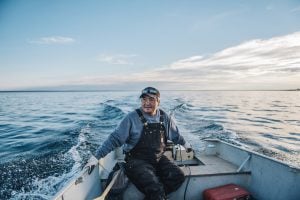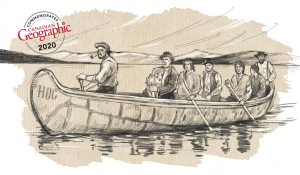
Environment
Inside the fight to protect the Arctic’s “Water Heart”
How the Sahtuto’ine Dene of Déline created the Tsá Tué Biosphere Reserve, the world’s first such UNESCO site managed by an Indigenous community
- 1693 words
- 7 minutes
Environment

Heiltsuk Nation’s Emergency Response Team
With an intimate knowledge of the lands and waters in their territories, First Nations are often the first on the scene in emergency situations — especially along the coast.
This week, the Government of Canada and the Heiltsuk Nation (near Bella Bella, B.C.) announced an agreement to enhance the Nation’s role in marine environmental responses to oil spills within its territory.
The Canadian Coast Guard, Transport Canada and the Heiltsuk Nation will develop a Marine Emergency Response Team pilot program to respond as a community to oil spills. As a pilot program, it will test concepts and add to future discussions for how to improve oil spill preparedness and response across the country.
“The Heiltsuk Nation has an obligation to take care of our territory, and this includes protecting it from oil spills,” says K?a?wa?zi? Marilyn Slett, Chief Councillor of the Heiltsuk Nation. “Developing a Marine Emergency Response Team is an important step towards fulfilling our vision of having full capacity to respond to pollution incidents in our territory.”
Heiltsuk first responders will be trained in spill response activities incorporating Heiltsuk geographic response strategies on on-water Coast Guard exercises.
The Mushkegowuk Marine Project
In October 2020, Mushkegowuk Chiefs moved forward with nation-to-nation talks with the federal government about establishing a National Marine Conservation Area for western James Bay (Cree: Weeneebayko) and southern Hudson Bay (Cree: Gitchie-Weeneebayko).
A website, launched by Wildlands League and Oceans North, supports these efforts to protect the distinct seascape of the region. It asks for interested individuals and organizations to write letters of support not to the government, but to Grand Chief Jonathan Solomon, Deputy Grand Chief Rebecca Friday, marine manager Lawrence Martin and director of lands and resources Vern Cheechoo.
The website and pre-written letters of support specifically ask those who don’t live in the region to express their support.
“Even though I live far away from western James Bay and southern Hudson Bay in Canada, I support safeguarding the Mushkegowuk way of life, millions of migratory birds, thousands of belugas, walruses, wetlands of the Hudson Bay Lowland that have been cooling the world for thousands of years and much, much more,” reads the letter.
The Mushkegowuk Council is still in the process of signing an agreement with Parks Canada to put the project in place.

Are you passionate about Canadian geography?
You can support Canadian Geographic in 3 ways:

Environment
How the Sahtuto’ine Dene of Déline created the Tsá Tué Biosphere Reserve, the world’s first such UNESCO site managed by an Indigenous community

People & Culture
Indigenous knowledge allowed ecosystems to thrive for millennia — and now it’s finally being recognized as integral in solving the world’s biodiversity crisis. What part did it play in COP15?

Environment
David Boyd, a Canadian environmental lawyer and UN Special Rapporteur on Human Rights and the Environment, reveals how recognizing the human right to a healthy environment can spur positive action for the planet

History
A look back at the early years of the 350-year-old institution that once claimed a vast portion of the globe